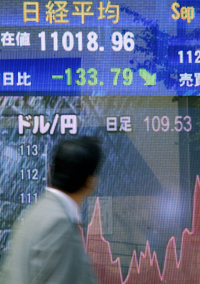|
1 This report is based on data and information available at the time of the Bank
of Japan Monetary Policy Meeting held on September 8 and 9, 2004.
2 The text of "The Bank's View" was decided by the Policy Board at the Monetary
Policy Meeting held on September 8 and 9, 2004.
September 9, 2004
Bank of Japan
|

|

A Japanese businessman looks at a Tokyo brokerage's monitor screen indicating Tokyo
stocks' fall of 133.79 points shortly before its closing Friday afternoon, Sept. 3,
2004. The Nikkei Stock Average of 225 issues fell 130.26 points, or 1.17 percent,
and closed at 11,022.49 points Friday. (AP Photo/Katsumi Kasahara)
|
|
Japan's economy continues to recover.
Exports and industrial production continue to increase, albeit at a slightly slower
pace. Business fixed investment has also been increasing with the ongoing improvement
in corporate profits. The employment situation has been on an improving trend, and
the decline in household income is coming to a halt. Private consumption continues
to show some positive movements. Meanwhile, housing investment has been nearly flat, and
public investment has been declining.
Japan's economy is expected to continue to recover, gathering stronger momentum.
Overseas economies are projected to continue to expand. Based on this projection, it is
likely that exports and domestic demand will continue to increase, and that production
will also continue to be on an uptrend. The impact of excessive debt in the corporate
sector and other structural factors on corporate activity is weakening. Although firms
are still restraining their labor costs, the positive effects of the increases in
production and corporate profits on household income are expected to become visible. Public
investment, meanwhile, is projected to be on a downtrend.
Developments in crude oil prices and their impact on the domestic as well as overseas
economies should continue to be noted.
On the price front, domestic corporate goods prices have been rising, due to the strengthening
of commodity prices at home and abroad and to the improvement in supply and demand
conditions. Consumer prices (excluding fresh food) have been declining slightly on a
year-on-year basis.

|

Japanese actress Koyuki poses with Panasonic's high-definition plasma display, Viera,
in Tokyo Tuesday, Sept. 7, 2004. Being an image character of the Viera series, Koyuki
plays in a promotion video that starts from October. (AP Photo/Shizuo Kambayashi)
|
|
Domestic corporate goods prices are expected to continue increasing for some time, partly due
to the rise in crude oil prices. On the other hand, supply and demand conditions are
likely to remain loose for the time being, although they are improving. Under these
circumstances, consumer prices are projected to basically continue falling slightly
on a year-on-year basis.
As for the financial environment, the environment for corporate finance is becoming more
accommodative on the whole, although it remains severe for firms with high credit risks. The
issuing environment for CP and corporate bonds is favorable on the whole. Also, the lending
attitude of private banks is becoming more accommodative. The lending attitude of financial
institutions as perceived by firms has been improving noticeably. The pace of decline in
credit demand in the private sector is becoming somewhat moderate. Under these
circumstances, the amount outstanding of CP and corporate bonds issued continues to
be above the previous year's level, and the rate of decline in lending by private banks
has basically been diminishing. As growth of banknotes in circulation is on a downtrend
mainly due to decreasing anxieties about the financial system, the year-on-year growth
rate of the monetary base has been at the 4.0-5.0 percent level. The year-on-year growth
rate of the money stock is around 2.0 percent. As for developments in financial
markets, money market conditions continue to be extremely easy, as the Bank of Japan
continues to provide ample liquidity. In the foreign exchange and capital markets,
the yen's exchange rate against the U.S. dollar, long-term interest rates, and stock
prices have been around the same level as last month.

